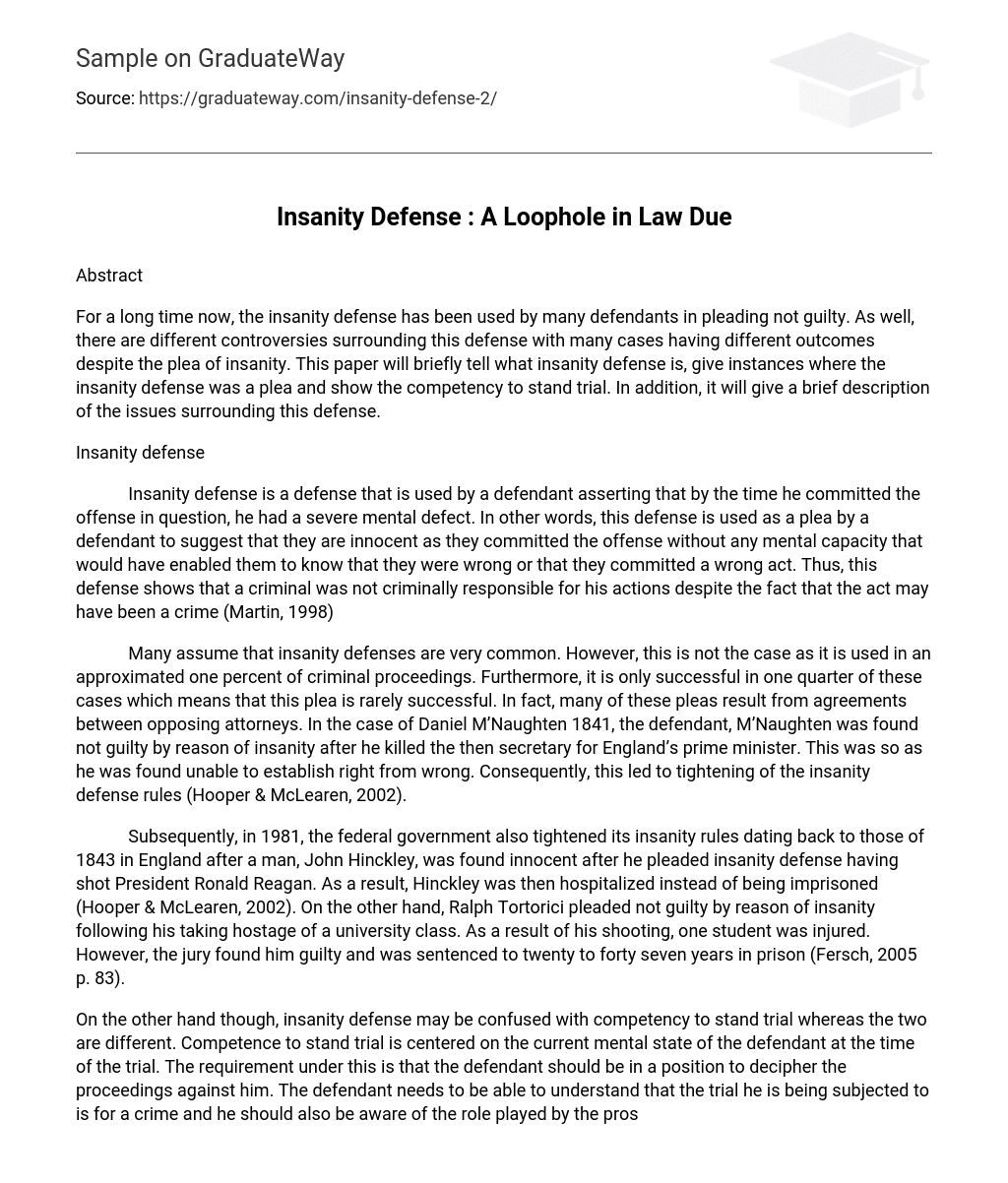Abstract
For a long time now, the insanity defense has been used by many defendants in pleading not guilty. As well, there are different controversies surrounding this defense with many cases having different outcomes despite the plea of insanity. This paper will briefly tell what insanity defense is, give instances where the insanity defense was a plea and show the competency to stand trial. In addition, it will give a brief description of the issues surrounding this defense.
Insanity defense
Insanity defense is a defense that is used by a defendant asserting that by the time he committed the offense in question, he had a severe mental defect. In other words, this defense is used as a plea by a defendant to suggest that they are innocent as they committed the offense without any mental capacity that would have enabled them to know that they were wrong or that they committed a wrong act. Thus, this defense shows that a criminal was not criminally responsible for his actions despite the fact that the act may have been a crime (Martin, 1998)
Many assume that insanity defenses are very common. However, this is not the case as it is used in an approximated one percent of criminal proceedings. Furthermore, it is only successful in one quarter of these cases which means that this plea is rarely successful. In fact, many of these pleas result from agreements between opposing attorneys. In the case of Daniel M’Naughten 1841, the defendant, M’Naughten was found not guilty by reason of insanity after he killed the then secretary for England’s prime minister. This was so as he was found unable to establish right from wrong. Consequently, this led to tightening of the insanity defense rules (Hooper & McLearen, 2002).
Subsequently, in 1981, the federal government also tightened its insanity rules dating back to those of 1843 in England after a man, John Hinckley, was found innocent after he pleaded insanity defense having shot President Ronald Reagan. As a result, Hinckley was then hospitalized instead of being imprisoned (Hooper & McLearen, 2002). On the other hand, Ralph Tortorici pleaded not guilty by reason of insanity following his taking hostage of a university class. As a result of his shooting, one student was injured. However, the jury found him guilty and was sentenced to twenty to forty seven years in prison (Fersch, 2005 p. 83).
On the other hand though, insanity defense may be confused with competency to stand trial whereas the two are different. Competence to stand trial is centered on the current mental state of the defendant at the time of the trial. The requirement under this is that the defendant should be in a position to decipher the proceedings against him. The defendant needs to be able to understand that the trial he is being subjected to is for a crime and he should also be aware of the role played by the prosecutor, defense attorney as well as the judge (Frontline, 2005).
Competency to stand trial aims at providing the most possible number of people in court in a day without including those who are not able to understand proceedings or those who are not in a position to help the attorneys. However should a defendant be found incompetent to trial, this means that there will be no trial and conviction or acquittal and it does not mean that the defendant has been found as not guilty (Frontline, 2005).
Insanity defense has however raised various controversial issues. In certain cases, it has been pointed out that lawyers use insanity defense to manipulate the courts while also abusing constitutional protections so as to free a guilty person. The major issue however seems to be the fact that there has not been a mutual agreement unto what should be used to determine if a person’s mental state is culpable. What is more, the matter of insanity can only be decided by the jury. Therefore insanity defense has often been perceived as a loophole in law due to the way that defendants and attorneys manipulate it and in the end a guilty person is set free whereas politicians and journalists also abuse the insanity pleas for individual reasons (Gado, 2008).
References
Fersch, E. L. (2005) Thinking about the Insanity Defense. iUniverse Publishers. p.83.
Frontline. (2005). A crime of insanity. Retrieved February 17, 2009 from
http://www.pbs.org/wgbh/pages/frontline/shows/crime/trial/faqs.html
Gado M. (2008). The insanity goes on. truTV. Retrieved February 17, 2009 from http://www.trutv.com/library/crime/criminal_mind/psychology/insanity/11.html
Hooper, F. J. & McLearen A. L. (2002). Does the Insanity Defense Have a Legitimate Role? Psychiatric times. Vol. 19 No. 4. Retrieved February 17, 2009 from http://www.psychiatrictimes.com/display/article/10168/54196
Martin, P. J. (1998). The Insanity defense: A closer look. Washington Post. Retrieved February 16, 2009 from http://www.washingtonpost.com/wp- srv/local/longterm/aron/qa227.htm





